★★★
“Forbearance. It’s vastly over-rated…”
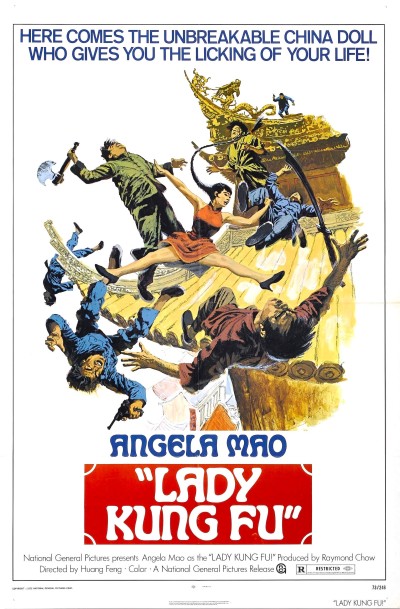 1934 Korea is under the yoke of Japanese occupation. At the hapkido school of martial arts, Yu Ying (Mao), Kao Chang (Wong) and Fan Wei (Hung) are learning the form. On graduation, they return to China and open an establishment of their own, only to fall foul of the Japanese Black Bear group, who bully both local residents and other schools, and try to run the hapkido practitioners out of town. Despite their teacher’s mantra of “Forbearance,” of which Ying has frequently to remind her colleagues, hot-headed Wei is eventually baited into fighting and killing some of the Black Bear students, and has to go into hiding. Chang’s efforts at diplomacy fare no better, leaving him beaten within an inch of his life, and the Bears seize the opportunity to tell Ying they’ll be incorporating her school into theirs. She finally realizes that turning the other cheek can only go so far before you have stand up for what’s right. Which, in this case, is some kicking of asses belong to the Japanese and their minions.
1934 Korea is under the yoke of Japanese occupation. At the hapkido school of martial arts, Yu Ying (Mao), Kao Chang (Wong) and Fan Wei (Hung) are learning the form. On graduation, they return to China and open an establishment of their own, only to fall foul of the Japanese Black Bear group, who bully both local residents and other schools, and try to run the hapkido practitioners out of town. Despite their teacher’s mantra of “Forbearance,” of which Ying has frequently to remind her colleagues, hot-headed Wei is eventually baited into fighting and killing some of the Black Bear students, and has to go into hiding. Chang’s efforts at diplomacy fare no better, leaving him beaten within an inch of his life, and the Bears seize the opportunity to tell Ying they’ll be incorporating her school into theirs. She finally realizes that turning the other cheek can only go so far before you have stand up for what’s right. Which, in this case, is some kicking of asses belong to the Japanese and their minions.
The film certainly loses points for obviously cloning Bruce Lee’s Fist of Fury, also released in 1972 and similarly based on a conflict between Japanese and Chinese martial arts schools. The strong anti-Japanese sentiment is no less shrill and strident here, and the style adopted for the fights is also largely similar, with one or other of our hero(in)es taking on a large group of rival students, before finally battling the big boss (or The Big Boss, if you prefer…). Still, this is remarkable for the future output of those involved in the film. As well as being an early entry in the careers of Mao, Wong and Hung, there are minor roles for Billy Chan, Lam Ching-Ying (Mr. Vampire), Yuen Biao, Corey Yuen (director of Yes, Madam, She Shoots Straight and DOA: Dead or Alive) and Jackie Chan, who plays one of the Black Bear students.
But it’s mainly a showcase for the leads, and the action demonstrates why they’d all go on, to varying extents, and become stars in their own right. Mao is, obviously, of most interest here. After an early demonstration in Korea, which shows her as the smartest and sharpest of the trio, she largely takes a back seat in the middle, trying to keep the peace and practice that whole “forbearance” thing, before exploding into action again at the end. Particularly cool is the use of her weighted braids as a weapon, to whip her opponent about the face – you never saw Bruce Lee do that! And this is probably what defines the film. When it’s trying to be no more than a Lee-mitator, it comes off as second best, for obvious reasons. However, when the creators go their own way, it’s inventive and much more entertaining as a result. Shame the ratio isn’t tilted more heavily towards the latter.
Dir: Huang Feng
Star: Angela Mao, Carter Wong, Sammo Hung, Bai Ying
a.k.a. Lady Kung Fu





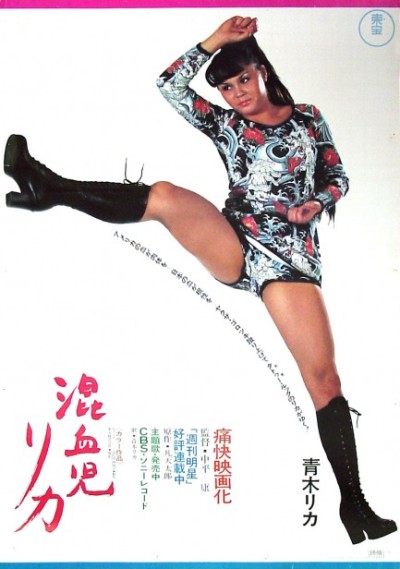 Aoki appears to have streaked like a star across the pinky violence firmament, appearing only in the trilogy of which this is the first, and one other film, Gakusei yakuza, before returning to the streets whence she came. Or I like to think that was her origin, anyway, and this is less a dramatic work, than a documentary depicting her life. Sharing the same name, Rika is the child of rape, a GI impregnating her mother before being deployed to Korea, and it’s not long before one of her mother’s boyfriends/customers [the film is sketchy on this detail] has taken a similar approach to Rika. She ends up heading an all-girl gang, but is sent to a reformatory after an opposing, male gang leader accidentally dies during a fight with her. But it’s not long before our heroine escapes, only to find some rivals have taken advantage of her absence, and the rest of the gang has been abducted and are about to be sold off to Vietnam. The boss offers to sell them to her instead, and Rika blackmails her father into paying up, only for the women to be sold anyway.
Aoki appears to have streaked like a star across the pinky violence firmament, appearing only in the trilogy of which this is the first, and one other film, Gakusei yakuza, before returning to the streets whence she came. Or I like to think that was her origin, anyway, and this is less a dramatic work, than a documentary depicting her life. Sharing the same name, Rika is the child of rape, a GI impregnating her mother before being deployed to Korea, and it’s not long before one of her mother’s boyfriends/customers [the film is sketchy on this detail] has taken a similar approach to Rika. She ends up heading an all-girl gang, but is sent to a reformatory after an opposing, male gang leader accidentally dies during a fight with her. But it’s not long before our heroine escapes, only to find some rivals have taken advantage of her absence, and the rest of the gang has been abducted and are about to be sold off to Vietnam. The boss offers to sell them to her instead, and Rika blackmails her father into paying up, only for the women to be sold anyway.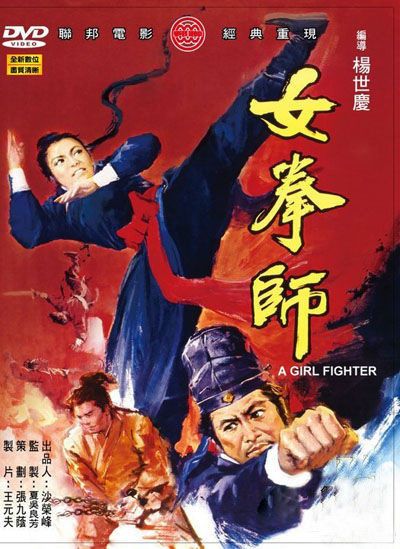
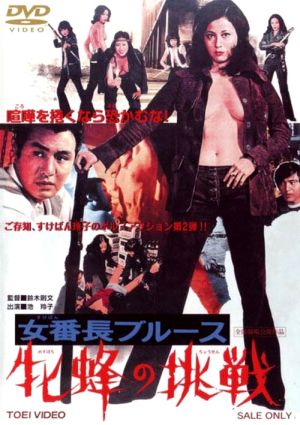 If the first Queen Bee movie was a fairly effective romp through the genre, that’s a lot less the case fot the follow-up, with Ike largely floundering around, as Maki, the leader of the Pearl Gang, who finds herself embroiled in a battle with another crew, the Black Lilies and their leader, Yuri (Kazama). Their spat is interrupted, when the Kuroji clan of yakuza throw their weight behind the Black Lilies. However, the triumph of the Lilies is short-lived, as they find out that they are about to be forced into life as prostitutes, for the benefit of their new allies, ending their life of freedom in the ‘hood. There are also subplots in which Yuri’s former boyfriend, Eizo wants to be a top racing driver, bringing him into conflict with the yakuza as well, and a suitcase filled with stolen guns.
If the first Queen Bee movie was a fairly effective romp through the genre, that’s a lot less the case fot the follow-up, with Ike largely floundering around, as Maki, the leader of the Pearl Gang, who finds herself embroiled in a battle with another crew, the Black Lilies and their leader, Yuri (Kazama). Their spat is interrupted, when the Kuroji clan of yakuza throw their weight behind the Black Lilies. However, the triumph of the Lilies is short-lived, as they find out that they are about to be forced into life as prostitutes, for the benefit of their new allies, ending their life of freedom in the ‘hood. There are also subplots in which Yuri’s former boyfriend, Eizo wants to be a top racing driver, bringing him into conflict with the yakuza as well, and a suitcase filled with stolen guns.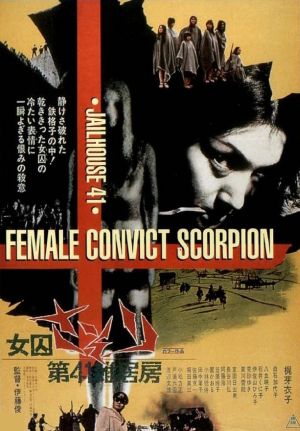 Right from the start, Nami (Kaji) established her utterly hardcore credentials, as she’s trying to dig her way out of the dungeon where she has been for the past year. With a spoon. Held in her teeth. She’s let out for the day because a bigwig is visiting, but takes the opportunity to attack warden Goda (Watanabe), almost depriving him of the sight of his other eye. As punishment for the resulting riot, Goda sends four guards to gang-rape Nami, and all the inmates are sent to a hard-labour camp. On the way back, they beat Nami as punishment, leaving her near-dead but it turns out that was just her ruse to get the guards to open the back of the van and escape. She leads the women across a blasted landscape, revenge once more on her mind, with Goda’s men in hot pursuit.
Right from the start, Nami (Kaji) established her utterly hardcore credentials, as she’s trying to dig her way out of the dungeon where she has been for the past year. With a spoon. Held in her teeth. She’s let out for the day because a bigwig is visiting, but takes the opportunity to attack warden Goda (Watanabe), almost depriving him of the sight of his other eye. As punishment for the resulting riot, Goda sends four guards to gang-rape Nami, and all the inmates are sent to a hard-labour camp. On the way back, they beat Nami as punishment, leaving her near-dead but it turns out that was just her ruse to get the guards to open the back of the van and escape. She leads the women across a blasted landscape, revenge once more on her mind, with Goda’s men in hot pursuit.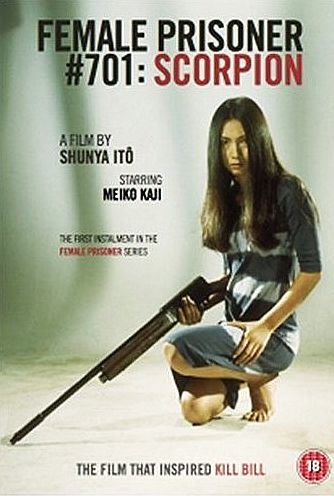
 This archetypal “women in prison” film is lifted above its colleagues in the genre, most of which are little more than crude exploitation, by being pretty damn sophisticated exploitation. The two main factors are Ito’s great sense of visual style, and Kaji’s almost-silent performance as Nami Matsushima. She ends up in jail after being betrayed by her cop boyfriend Sugimi (Isao), who turns out to be in league with the Yakuza he was investigating. Nami vows to escape, and the film starts with her doing so, but she is quickly recaptured, thrown back into jail, and her fellow inmates are punished for her actions, causing them to turn against her. While not her fault, she’s involved in an incident which costs the warden (Watanabe) his eye, and he vows to break her at any cost. That’s an awful lot easier said then done, and what happens as a result might be what Nami wanted all along. Meanwhile, Sugimi, seeking to tie up the loose end she represents, promises another inmate, Katagiri (Yokoyama) parole, if she takes care of Nami.
This archetypal “women in prison” film is lifted above its colleagues in the genre, most of which are little more than crude exploitation, by being pretty damn sophisticated exploitation. The two main factors are Ito’s great sense of visual style, and Kaji’s almost-silent performance as Nami Matsushima. She ends up in jail after being betrayed by her cop boyfriend Sugimi (Isao), who turns out to be in league with the Yakuza he was investigating. Nami vows to escape, and the film starts with her doing so, but she is quickly recaptured, thrown back into jail, and her fellow inmates are punished for her actions, causing them to turn against her. While not her fault, she’s involved in an incident which costs the warden (Watanabe) his eye, and he vows to break her at any cost. That’s an awful lot easier said then done, and what happens as a result might be what Nami wanted all along. Meanwhile, Sugimi, seeking to tie up the loose end she represents, promises another inmate, Katagiri (Yokoyama) parole, if she takes care of Nami.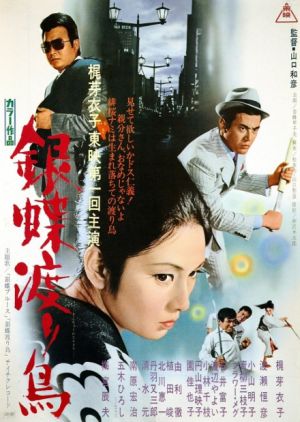 Nami is sent to jail for killing a Yakuza boss, and when she is released, returns to the Ginza district of Tokyo to live with her uncle, who runs a pool hall. She gets a job as a hostess in a bar, with the help of her new friend Ryuji (Watase), but the quiet life doesn’t last for long, even as she tries to help the widow of the man she killed – whose petition on behalf of Nami is what helped lead to her early release. For the local mob, in the shape of Okada (Nanbara) and his gang, are sniffing around the bar, seeking to take it over. To settle things, Nami offers to take on Okada’s champion at billiards, a challenge the gangster readily accepts, not realizing he has just been hustled, and that Nami is no mean player herself. Can she win – and even if she does, will Okada live up to his side of the bet?
Nami is sent to jail for killing a Yakuza boss, and when she is released, returns to the Ginza district of Tokyo to live with her uncle, who runs a pool hall. She gets a job as a hostess in a bar, with the help of her new friend Ryuji (Watase), but the quiet life doesn’t last for long, even as she tries to help the widow of the man she killed – whose petition on behalf of Nami is what helped lead to her early release. For the local mob, in the shape of Okada (Nanbara) and his gang, are sniffing around the bar, seeking to take it over. To settle things, Nami offers to take on Okada’s champion at billiards, a challenge the gangster readily accepts, not realizing he has just been hustled, and that Nami is no mean player herself. Can she win – and even if she does, will Okada live up to his side of the bet?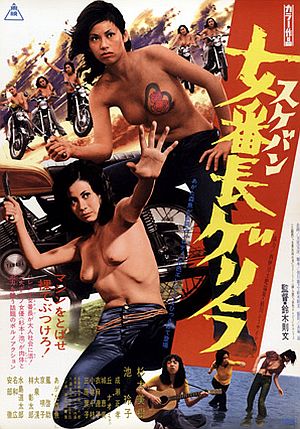 After my disappointing first foray, this is more like it, right from the moment Sachiko (Sugimoto) rips open her top, revealing a heavily-tattooed breast, before she and her Red Helmet Gang of biker chicks kick the asses of another, male gang who are hassling them. It’s clear that Sachiko deserves the title far more that the ‘Delinquent Girl Boss’. She and her crew from Tokyo head off to Kyoto, where they face off against, and end up taking control of, the local girl gang – some of whom are none to happy by this invasion [Kyoto being the former capital, its residents seems to hold a grudge against those from Tokyo]. Sachiko ends up on the wrong side of the local Yakuza, one of whom has a sister, Nami (Ike), who is an independent free-agent girl gangster, affiliated with none, but kinda over-seeing all. Sachiko meets and falls for a boxer, Ichiro (Mizushimi), after he helps her girls out of a tough spot with the Yakuza, and follows him to a seaside resort where he is training. Needless to say, love does
After my disappointing first foray, this is more like it, right from the moment Sachiko (Sugimoto) rips open her top, revealing a heavily-tattooed breast, before she and her Red Helmet Gang of biker chicks kick the asses of another, male gang who are hassling them. It’s clear that Sachiko deserves the title far more that the ‘Delinquent Girl Boss’. She and her crew from Tokyo head off to Kyoto, where they face off against, and end up taking control of, the local girl gang – some of whom are none to happy by this invasion [Kyoto being the former capital, its residents seems to hold a grudge against those from Tokyo]. Sachiko ends up on the wrong side of the local Yakuza, one of whom has a sister, Nami (Ike), who is an independent free-agent girl gangster, affiliated with none, but kinda over-seeing all. Sachiko meets and falls for a boxer, Ichiro (Mizushimi), after he helps her girls out of a tough spot with the Yakuza, and follows him to a seaside resort where he is training. Needless to say, love does